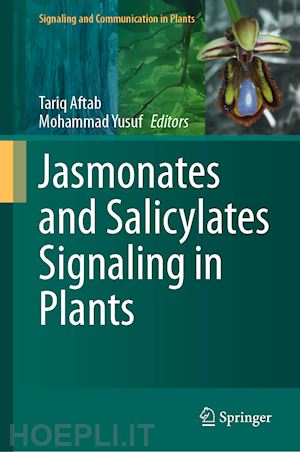
Questo prodotto usufruisce delle SPEDIZIONI GRATIS
selezionando l'opzione Corriere Veloce in fase di ordine.
Pagabile anche con Carta della cultura giovani e del merito, 18App Bonus Cultura e Carta del Docente
Demand for agricultural crops and nutritional requirement continues to escalate in response to increasing population. Also, climate change exerts adverse effects on agriculture crop productivity. Plant researchers have, therefore, focused to identify the scientific approaches that minimize the negative impacts of climate change on agricultural crops. Thus, it is the need of the hour to expedite the process for improving stress tolerance mechanisms in agricultural crops against various environmental factors, in order to fulfil the world’s food demand. Among the various applied approaches, the application of phytohormones has gained significant attention in inducing stress tolerance mechanisms.
Jasmonates are phytohormones with ubiquitous distribution among plants and generally considered to modulate many physiological events in higher plants such as defence responses, flowering and senescence. Also, jasmonates mediate plant responses to many biotic and abiotic stresses by triggering a transcriptional reprogramming that allows cells to cope with pathogens and stresses. Likewise, salicylates are important signal molecules for modulating plant responses to environmental stresses. Salicylic acid influences a range of diverse processes in plants, including seed germination, stomatal closure, ion uptake and transport, membrane permeability and photosynthetic and growth rate.
Understanding the significant roles of these phytohormones in plant biology and from agriculture point of view, the current subject has recently attracted the attention of scientists from across the globe. Therefore, we bring forth a comprehensive book “Jasmonates and Salicylates Signalling in Plants” highlighting the various prospects involved in the current scenario. The book comprises chapters from diverse areas dealing with biotechnology, molecular biology, proteomics, genomics, metabolomics, etc. We are hopeful that this comprehensive book furnishes the requisite of all those who are working or have interest in this topic.
Tariq Aftab received his Ph.D. in the Department of Botany at Aligarh Muslim University, India, and is currently Assistant Professor there. He is Recipient of a prestigious Leibniz-DAAD fellowship from Germany, Raman Fellowship from the Government of India, and Young Scientist Awards from the State Government of Uttar Pradesh (India) and Government of India. After completing his doctorate, he has worked as Research Fellow at National Bureau of Plant Genetic Resources, New Delhi, and as Postdoctoral Fellow at Jamia Hamdard, New Delhi, India. Dr. Aftab also worked as Visiting Scientist at Leibniz Institute of Plant Genetics and Crop Plant Research (IPK), Gatersleben, Germany, and in the Department of Plant Biology, Michigan State University, USA. He is a member of various scientific associations from India and abroad. He has edited 10 books with international publishers, including Elsevier Inc., Springer Nature and CRC Press (Taylor & Francis Group), co-authored several book chaptersand published over 65 research articles in peer-reviewed international journals. His research interests include physiological, proteomic and molecular studies on medicinal and crop plants.
Mohammad Yusuf is working as a Lecturer in the Department of Biology, United Arab Emirates University, Al Ain, UAE. Mohammad received his Ph.D. in Plant Physiology and M.Sc. in Botany (Plant Physiology) from Aligarh Muslim University, India. He has worked as SERB-Young Scientist on Government of India funded project. He has been awarded with the prestigious Dr. D.S. Kothari Postdoctoral Fellowship from the Government of India and CST-UP Young Scientist from the state Government of Uttar Pradesh (India). He has also been invited to present his work in Gordon Research Conference at Switzerland and Huazhong Agricultural University (HAU), Wuhan, China. Mohammad’s research contribution includes more than 50 research articles in the international journals of repute and a book. His Google Scholar citations have crossed 2500 with 26 h-index. He is an active reviewer of various reputed journals from Elsevier and Springer. Currently, he is exploring phytohormone-mediated abiotic stress tolerance mechanism in crop plants through proline metabolism.











Il sito utilizza cookie ed altri strumenti di tracciamento che raccolgono informazioni dal dispositivo dell’utente. Oltre ai cookie tecnici ed analitici aggregati, strettamente necessari per il funzionamento di questo sito web, previo consenso dell’utente possono essere installati cookie di profilazione e marketing e cookie dei social media. Cliccando su “Accetto tutti i cookie” saranno attivate tutte le categorie di cookie. Per accettare solo deterninate categorie di cookie, cliccare invece su “Impostazioni cookie”. Chiudendo il banner o continuando a navigare saranno installati solo cookie tecnici. Per maggiori dettagli, consultare la Cookie Policy.